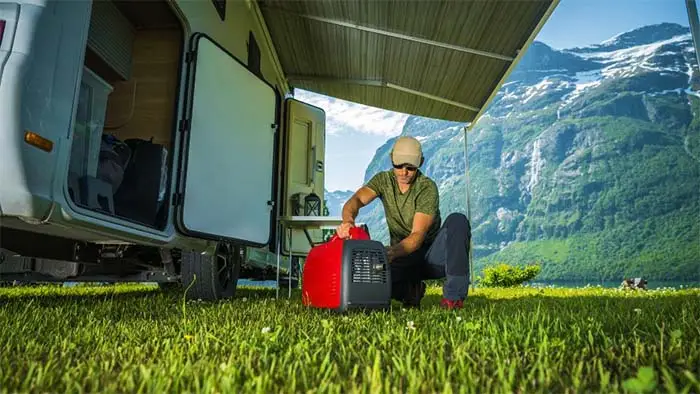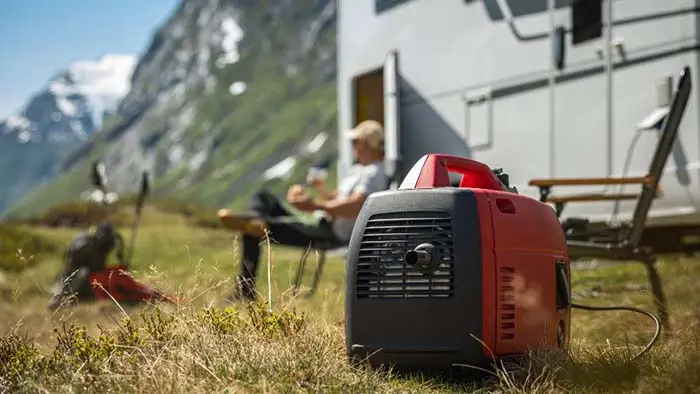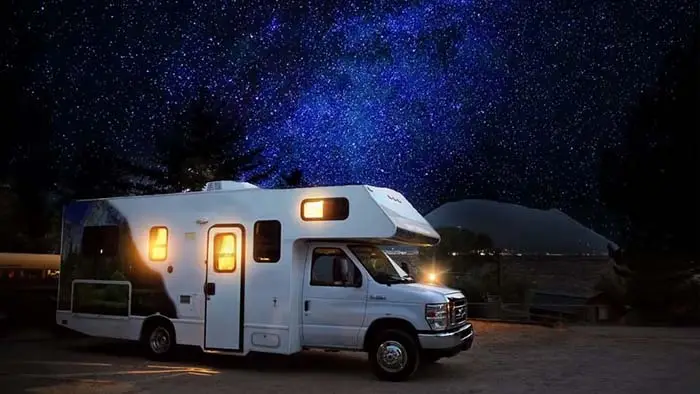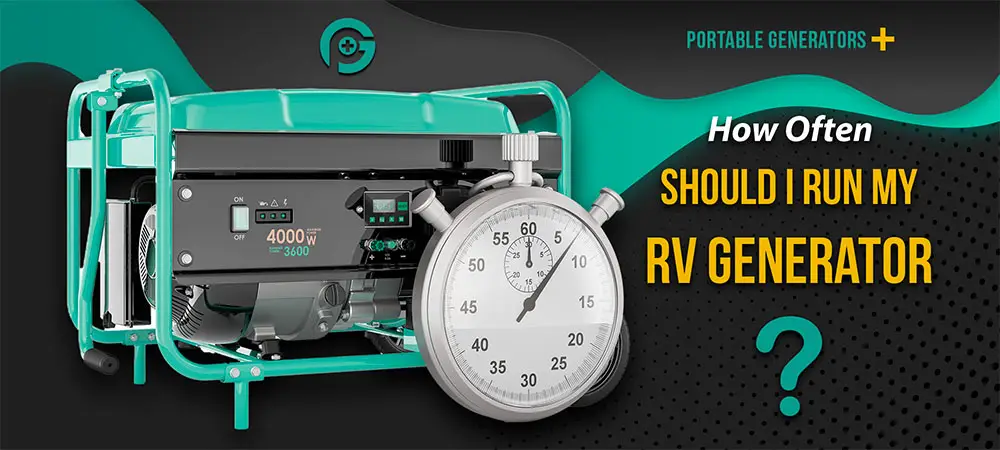How Often Should I Run My RV Generator? - Quick Answer...
Running your RV generator for at least 2 hours every month is generally recommended to maintain optimal performance and prevent fuel deterioration.
Among many other things (see below), this will help circulate the fuel, preventing fuel system issues and keep the battery charged up.
Introduction
Question: How Often Should I Run My RV Generator?
If you’re a proud owner of an RV and enjoy hitting the road for camping trips or long vacations, you may find yourself wondering, “How often should I run my RV generator?” Whether it’s for maintaining its performance or prolonging its lifespan, understanding the optimal frequency for running your RV generator is crucial.
In this article, we will explore the different factors to consider when determining how often you should run your RV generator, providing you with valuable insights to ensure a smooth and worry-free experience during your adventures on the road.

NOTE: We know the way the question “How Often Should I Run My RV Generator?” is written in a somewhat convoluted way, but it is the way the question is searched for. To show up as an answer in the search results, we have to quote the question as asked. Cheers.
Factors to Consider
Fuel Type
The type of fuel your RV generator uses is an important factor to consider when determining how often you should run it. Different fuel types have different shelf lives, and running the generator regularly can help prevent fuel deterioration.
Gasoline typically has a shelf life of about 6 months before it starts to degrade, while diesel fuel can last up to a year. Propane, on the other hand, does not have a shelf life and can be stored indefinitely. Keep in mind that running the generator periodically will also help prevent fuel varnish and deposits from building up in the fuel system.
Generator Type
The type of generator you have can also impact how often you should run it. There are two main types of RV generators: portable and built-in. Portable generators are typically smaller and designed to be used intermittently. They are often used for camping trips or other outdoor activities.
Built-in generators, on the other hand, are permanently installed in your RV and are designed to be used more frequently. The type of generator you have will determine how often it needs to be run to maintain optimal performance.
Usage Frequency
Another important factor to consider is how often you use your RV and its generator. If you are a frequent traveler and use your RV regularly, it is generally recommended to run the generator for at least 2 hours every month.
This will help ensure that the generator stays in good working condition and that the fuel and other components are properly circulated. However, if you only use your RV occasionally, such as for weekend getaways or vacations, you may need to run the generator more often to prevent fuel degradation and other issues.
Weather Conditions
The weather conditions in which you store and operate your RV can also impact how often you should run the generator. In colder climates, it is especially important to run the generator regularly to prevent fuel gelling and ensure that the engine stays lubricated.
Cold weather can cause fuel to thicken, making it difficult to start the generator. Running it periodically will help keep the fuel flowing and prevent any damage. On the other hand, in hot climates, running the generator can help prevent issues with fuel vaporization and keep the engine cool.
Battery Health
The health of your RV’s battery is another factor to consider when determining how often to run the generator. Running the generator regularly can help keep the battery charged and prevent it from draining completely.
This is especially important if you have appliances or systems in your RV that rely on battery power, such as lights, water pumps, or electronic devices.
If the battery is not regularly charged, it can lead to battery degradation and a shorter lifespan. Running the generator will help ensure that the battery remains in good condition and ready for use.
Recommendations for Different Scenarios
Regular Usage
If you use your RV frequently, such as for full-time living or extended road trips, it is recommended to run the generator for at least 2 hours every month. This will help keep the fuel fresh, prevent fuel system issues, and ensure that the generator is ready for use whenever you need it.
Regular exercise of the generator also helps lubricate the engine and prevent any parts from seizing up due to lack of use.
Occasional Usage
If you only use your RV occasionally, such as for weekend getaways or vacations, it is recommended to run the generator for at least 2-3 hours every month. This will help prevent fuel degradation and ensure that the generator is in good working condition when you need it.
Running the generator periodically will also help keep the battery charged and ready for use.
Extended Storage
If you are planning to store your RV for an extended period, such as during the winter months, it is important to properly prepare the generator. Before storing the RV, make sure to run the generator for at least 2 hours to circulate fresh fuel and stabilize the fuel system.
It is also recommended to add a fuel stabilizer to the fuel tank to prevent fuel degradation. Additionally, disconnecting the battery or using a battery maintainer can help prevent drainage and extend the battery’s lifespan.
Cold Climate
In cold climates, it is important to run the generator more frequently to prevent fuel gelling and ensure proper lubrication. It is recommended to run the generator for at least 2 hours every month, even during periods of non-use.
This will help keep the fuel flowing and prevent any issues with starting the generator in cold weather. Adding a fuel stabilizer specifically designed for cold weather can also help prevent fuel system issues during winter storage.

Hot Climate
In hot climates, running the generator regularly can help prevent issues with fuel vaporization and help keep the engine cool. It is recommended to run the generator for at least 2 hours every month to ensure that the fuel is properly circulated and to prevent any fuel system issues.
It is also important to store the RV in a shaded area or use a cover to protect it from direct sunlight, which can cause the generator to overheat.
Maintenance Tips
Regular Exercise
Running the generator regularly is one of the most important maintenance tasks. Regular exercise helps keep the engine lubricated, prevents parts from seizing up, and ensures that the fuel and other components are properly circulated. Aim to run the generator for at least 2 hours every month, even if you are not using your RV regularly.
Fuel Stabilizer
Using a fuel stabilizer is essential, especially if you store your RV for extended periods or live in areas with fluctuating temperatures. Add a fuel stabilizer to the fuel tank before storing the RV to prevent fuel degradation and varnish build-up in the fuel system. Follow the manufacturer’s instructions on the appropriate amount of stabilizer to use based on the fuel capacity of your RV.
Oil Change
Regular oil changes are crucial for maintaining the longevity and performance of your RV generator. Check the manufacturer’s guidelines for the recommended oil change intervals and use high-quality oil that meets the specifications outlined in the generator’s owner’s manual. Be sure to properly dispose of the used oil in accordance with local regulations.
Air Filter Cleaning
Cleaning or replacing the air filter regularly is important for optimal generator performance. A dirty or clogged air filter can restrict airflow to the engine, leading to reduced power output and increased fuel consumption. Follow the manufacturer’s guidelines on how often to clean or replace the air filter, and be sure to use the recommended filter type for your specific generator model.
Battery Maintenance
Proper battery maintenance is essential for reliable generator operation. Check the battery regularly for any signs of corrosion, loose connections, or low voltage. Clean the battery terminals and cables as needed, and consider using a battery maintainer or disconnecting the battery during periods of non-use to prevent drainage.
Benefits of Running the RV Generator
Battery Charging
Running the RV generator helps keep the battery charged, ensuring that it is ready for use when needed. This is especially important if you have appliances or systems in your RV that rely on battery power, such as lights, water pumps, or electronic devices. Regularly running the generator will help prevent the battery from draining completely, which can lead to degradation and a shorter lifespan.
Appliance Functionality
Running the RV generator allows you to power all of the appliances and systems in your RV, providing you with the comforts of home while on the road. This includes running the air conditioner, refrigerator, microwave, and other essential appliances. Regular exercise of the generator ensures that it is capable of supplying the necessary power to operate these appliances effectively.
Preventive Maintenance
Regularly running the RV generator is a form of preventive maintenance. It helps keep the engine lubricated, prevents parts from seizing up, and allows the fuel and other components to circulate properly. This can help prevent costly repairs and ensure that the generator is always ready for use. Regular exercise also helps identify any potential issues or malfunctions early on, allowing for timely repairs and maintenance.
Avoiding Stagnant Fuel
Running the RV generator on a regular basis helps prevent fuel from becoming stagnant and degrading over time. Stagnant fuel can lead to varnish build-up in the fuel system, clogged fuel lines, and other issues that can affect the generator’s performance. Regular exercise helps keep the fuel fresh and prevents these issues from occurring.
Carbon Build-up Reduction
Running the RV generator under load helps burn off excess carbon deposits that can accumulate inside the engine. Carbon build-up can restrict airflow and lead to reduced power output and increased fuel consumption. Regularly running the generator at or near its rated load helps prevent carbon build-up and ensures optimal performance.

Potential Issues of Not Running the RV Generator
Fuel Deterioration
Not running the RV generator regularly can lead to fuel deterioration, especially if the fuel has been sitting in the tank for an extended period. Deteriorated fuel can clog the fuel system, cause starting issues, and affect the generator’s performance. Regularly exercising the generator helps keep the fuel fresh and prevents fuel degradation.
Starter Motor Problems
Lack of use can lead to starter motor problems in the RV generator. The starter motor is responsible for initiating the engine’s combustion process, and if it is not used regularly, it can become seized or fail to operate properly. Regularly running the generator helps keep the starter motor in good working condition and prevents any issues with starting the generator.
Fuel Lines Clogging
When the RV generator is not run regularly, fuel can become stagnant in the fuel lines, leading to clogs and obstructions. Clogged fuel lines can prevent fuel from reaching the engine, resulting in starting issues or an engine that does not run smoothly. Regular exercise of the generator helps prevent fuel lines from clogging and ensures proper fuel flow.
Carburetor Issues
Carburetor issues can arise from not running the RV generator regularly. Lack of use can cause fuel varnish and deposits to build up in the carburetor, leading to clogs and malfunctions. These issues can affect the generator’s performance and result in starting issues or poor fuel efficiency. Regular exercise helps prevent carburetor issues and keeps the generator running smoothly.
Stagnant Fuel Filters
Stagnant fuel inside the generator’s fuel filters can lead to clogs and restricted fuel flow. This can result in starting issues, engine misfires, or a generator that does not run at all. Regularly running the generator helps prevent fuel from becoming stagnant in the filters and ensures that the fuel flow is not obstructed.
Factors Impacting Fuel Consumption
Appliance Usage
The more appliances and systems you have running in your RV, the more fuel your generator will consume. Appliances such as air conditioners, refrigerators, microwaves, and televisions require a significant amount of power and can increase fuel consumption. Be mindful of the appliances you are using and their power requirements to manage fuel consumption effectively.
Generator Load
The load placed on the generator also impacts fuel consumption. Higher loads, such as running multiple appliances simultaneously or using high-wattage equipment, will require more fuel to meet the demand. Conversely, running the generator at a lower load can help conserve fuel. It is important to balance the power needs of your RV with fuel efficiency when running the generator.
Efficiency of Generator
The efficiency of the generator itself plays a role in fuel consumption. Modern generators are designed to be more fuel efficient, utilizing advanced engine technology and control systems. Older generators may consume more fuel compared to newer models. Regular maintenance, such as oil changes and air filter cleaning, will help ensure that the generator operates at maximum efficiency and minimizes fuel consumption.
Weather Conditions
Weather conditions can also impact fuel consumption. Extreme temperatures, both hot and cold, can affect how the generator operates and how much fuel it consumes. In cold weather, the generator may require more fuel to start and operate due to increased engine load. In hot weather, the generator may consume more fuel to help cool the engine and maintain optimal performance. It is important to consider these factors when planning your generator usage and fuel consumption.
Altitude
Higher altitudes can also impact fuel consumption. At higher altitudes, the air is thinner, which affects the efficiency of the engine combustion process. The generator may consume more fuel to compensate for the reduced oxygen levels in the air. If you are planning to use your RV generator at high altitudes, be prepared for increased fuel consumption and adjust your usage accordingly.

Signs of a Generator Needing to Run
Stale Fuel Smell
If you detect a stale or sour smell coming from your RV generator, it is a sign that the fuel may have deteriorated and needs to be circulated. Running the generator periodically helps prevent fuel degradation and keeps the fuel fresh. If you notice a persistent stale fuel smell, it is a good indication that the generator should be run.
Difficulty Starting
Having difficulty starting the RV generator is another sign that it needs to be run. Lack of use can lead to issues with the starter motor, fuel lines, or carburetor, making it difficult for the generator to start. Regularly exercising the generator helps keep these components in good working condition and ensures that the generator starts easily when needed.
Malfunctioning Appliances
If you notice that appliances or systems in your RV are not functioning properly, it may be a sign that the generator needs to be run. Inadequate or inconsistent power supply can cause appliances to malfunction or operate at reduced capacity. Running the generator will help ensure that all appliances and systems receive the necessary power and function as intended.
Low Battery Voltage
Low battery voltage is another indication that the RV generator needs to be run. If the battery voltage is consistently low or if you notice that lights or other electronics are dimming, it may be a sign that the battery needs to be charged. Running the generator will help charge the battery and ensure that it remains in good condition.
Generator Error Codes
Modern RV generators are often equipped with diagnostic systems that display error codes when there is an issue. If you see any error codes or warning lights on your generator’s control panel, it is important to consult the owner’s manual or contact a qualified technician. Running the generator may help reset or clear certain error codes, but it is important to address any underlying issues to prevent further damage.
Length of Generator Operation
Short Duration
Short-duration generator operation refers to running the generator for a shorter period, typically less than 2 hours. This may be sufficient for basic maintenance routines, such as lubricating the engine and circulating the fuel. Short-duration operation is often recommended when the generator is not in frequent use or during moderate weather conditions.
Moderate Duration
Moderate-duration generator operation refers to running the generator for 2-4 hours. This duration allows for thorough fuel circulation, preventing fuel deterioration and varnish build-up. Moderate-duration operation is often suitable for regular exercise of the generator, maintaining its performance, and ensuring the battery remains charged.
Extended Duration
Extended-duration generator operation refers to running the generator for more than 4 hours, up to 8 hours or longer. This is often necessary during periods of heavy power usage or when running power-intensive appliances, such as air conditioners or electrical heaters. Extended-duration operation provides sustained power supply and ensures the generator functions optimally.
Rotating Usage Schedule
A rotating usage schedule refers to alternating the use of your RV generator among different appliances or systems. This can help distribute the load and prevent excessive strain on the generator. For example, rather than running multiple high-wattage appliances simultaneously, you can stagger their usage to ensure the generator operates within its recommended load range and fuel consumption is managed effectively.
Battery Charging Time
Battery charging time refers to the duration required for the generator to charge the RV’s battery adequately. This will depend on factors such as the battery capacity, state of charge, and whether any appliances or systems are drawing power from the battery during charging. It is important to allow sufficient time for the battery to reach a full charge to avoid premature battery degradation and ensure optimal performance.
Understanding Generator Warranty
Manufacturer’s Guidelines
Understanding the manufacturer’s guidelines is essential for maintaining your RV generator’s warranty. These guidelines outline the recommended maintenance procedures, usage requirements, and any specific warranty terms and conditions. It is important to carefully read and follow these guidelines to ensure that your warranty remains valid.
Maintenance Requirements
Proper maintenance is often a requirement for maintaining the generator’s warranty. This includes regular oil changes, air filter cleaning or replacement, fuel stabilizer use, and other maintenance tasks outlined in the manufacturer’s guidelines. Following the recommended maintenance schedule will help keep your generator in good working condition and preserve the warranty coverage.
Warranty Void Conditions
There are certain conditions that can void your RV generator’s warranty. These may include failure to follow the recommended maintenance procedures, using improper fuel or oil, unauthorized modifications or repairs, and other actions not in line with the manufacturer’s guidelines. It is important to be aware of these warranty void conditions to prevent inadvertently voiding your warranty.
Authorized Service Centers
In the event that your RV generator requires repairs or servicing, it is important to use authorized service centers. Authorized service centers have trained technicians who are familiar with the specific requirements of your generator model. Using unauthorized service centers may void your warranty and can potentially result in improper repairs or further damage to the generator.
Extended Warranty Options
If you want additional coverage beyond the manufacturer’s warranty, you may consider purchasing an extended warranty. Extended warranties provide peace of mind by extending the coverage period and often include additional benefits such as roadside assistance and coverage for certain repair expenses. Be sure to carefully review the terms and conditions of the extended warranty before making a purchase.

NOTE: We know the way the question “How Often Should I Run My RV Generator?” is written in a somewhat convoluted way, but it is the way the question is searched for. To show up as an answer in the search results, we have to quote the question as asked. Cheers.
Determining Your RV Generator Schedule
Evaluation of Factors
Determining your RV generator schedule requires evaluating the various factors discussed earlier. Consider the fuel type, generator type, usage frequency, weather conditions, and battery health. Determine how each factor applies to your specific RV and usage patterns to create a suitable generator schedule.
Manufacturer Recommendations
Consult the manufacturer’s recommendations for your specific generator model. Manufacturers often provide guidelines for maintenance intervals, usage requirements, and other important considerations. These recommendations are based on the manufacturer’s expertise and can help ensure that your generator operates optimally and remains in warranty compliance.
Usage Analysis
Analyze your RV’s typical usage patterns to determine how often you use the generator and its power requirements. Consider the appliances and systems you regularly use and their power demands. This will help determine the generator’s load and the frequency at which it needs to be run to meet your specific needs.
Weather Consideration
Take into account the weather conditions in which you store and operate your RV. If you live in a cold climate, for example, you may need to run the generator more frequently to prevent fuel gelling and ensure proper lubrication. Similarly, in hot climates, running the generator regularly can help prevent issues with fuel vaporization and overheating.
Battery Monitoring
Monitor the health and charge level of your RV’s battery to determine the need for generator operation. If you notice a consistently low battery voltage or signs of battery degradation, it may be an indication that the generator needs to be run more frequently to keep the battery charged and in good condition.
By considering these factors and evaluating your specific RV and usage patterns, you can determine an appropriate generator schedule that ensures optimal performance, minimizes potential issues, and extends the lifespan of your RV generator. Running the generator regularly and following the recommended maintenance tasks will help keep your RV powered and ready for any adventure on the road.
Hope this was helpful, and thanks for reading.
Cheers!


